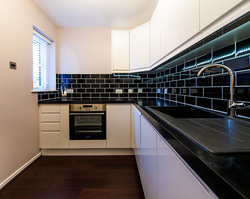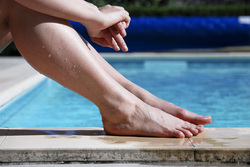 We recently moved, and our kitchen is great. We have more counter space and cabinet space, as well as overall square footage for a table and storage. Nevertheless, with all of this space, I find myself cleaning it more, not because I have to, but because I want to. I want to have a clean kitchen. I wipe down the counters daily, scrub out the sink, and make sure that the stove is sparkling. The floors - well, you probably wouldn't want to eat off of them, but they are generally spot-free. Why did this change from our teeny, tiny, seemingly easier-to-clean kitchen in our previous apartment? I'm not what you would call a clean freak. I don't get excited about different spray cleaners or debate the merits of microfiber versus cotton cloths. But something about having manageable space has actually changed my habits and style. My environment is affecting my actions. Has this ever happened to you? Instead of groggily searching for workout gear at 6 am, you have a special drawer with outfits already put together. You keep your spices well within reach of your stove so that your healthful dishes turn out deliciously. Your stationary bike or treadmill is not, in fact, covered in clothes but instead is oiled and ready to be used! How our environment is set up can affect our ability to change, and is one major tool we can use to support a new habit. I hope that my motivation continues with my new kitchen, and I think it will. The excitement of leaving it neat and tidy is self-perpetuating, increasing my confidence that it is manageable and rewarding. What one thing could you change about your environment (short of moving!) that would support a goal you are trying to achieve? I'd love to hear your ideas at amanda@wellfulcoaching.com. Have a wellful day! Amanda PS - The kitchen pictured is not ours! :)
 I stopped blogging a few months ago when, well, I just couldn’t do it. I felt sick, nauseated, and energy-less. All.of.the.time. And it lasted for three months. What happened? How did I start feeling better? Well, I started my second trimester. Ha. I know, I know, for many of you, this is not news. But wow, talk about a life change. My thoughts went from communicating with others to what was happening inside my body. I focused not on my business but on passing each day with new techniques to manage the nausea. I was pulled away from what had recently been so important to something even more important - my health and my growing baby’s health. Has this ever happened to you? You start a new diet when suddenly a family member gets sick and you survive on hospital food and take out. An exercise routine is no longer routine when you move to a new city and don’t have access to a gym. Your own health changes and you find that your previous strategies for managing stress no longer work. What to do? Assessment of the stages of change is an important factor here. If you have just begun to make something a habit and are working through the hiccups, you are in action. If a habit has been in place for 6 months or more and it’s your routine, then you are in maintenance. In either case, with an upheaval, you might work backwards to find where you are. In a new city, what are your options for gyms? Doing some research in the preparation stage might be in order. Have your priorities shifted? Is exercise or your new diet still ranked as high? Maybe it’s time to work through some thinking and feeling time in contemplation. The important thing to know is that you don’t have to think of goal accomplishment as all or nothing. If you are even thinking about your current situation, then you are in the process of making change, just in an early stage. Talking it out with a friend or finding a coach can help you get back on track towards your healthy goal. I knew that there was a time limit to the nausea, and I kept my goal of getting back into the pool and swimming with my Master’s class again in the forefront of my mind to get me through those three months. Ok, ok, so my workouts aren’t as strenuous as they were before! I know that I have to listen to my body and not push it. As soon as I felt up to it, I dove back in, and it felt great. I’m lucky to have a swimming coach that will tailor a workout to my needs. Have you ever felt stalled in your health goals because of unforeseen circumstances? What did you do to get back on track? Did you end up taking a different path than you originally took? I’d love to hear your story: amanda@wellfulcoaching.com. Thanks for reading! Amanda
 I remember so vividly what a colleague, mentor, and friend expressed to me one day regarding her desire, frustration, and eventual success around losing weight. She said, "One day I realized that I had to stop talking about losing weight and start doing something about it." (I wonder if she'll read this and remember saying that!) It struck me so forcefully, even before I knew I wanted to be a wellness coach, that actually doing something is the hardest part. She so strongly wanted the change to happen, but the motivation to action hadn't taken hold yet. In the post below by Marc and Angel Hack Life about choices that keep us more miserable than happy, the fourth choice is, "Changing nothing and expecting different results." How many times do we lament that something isn't working, but don't do what is necessary to change it? The serenity prayer asks for, "the courage to change the things I can." What can you do, today, that would be a courageous step on the path towards better wellness? The complete post is here: http://www.marcandangel.com/2013/09/10/7-miserable-choices-you-make-too-often/
 Just imagine the headline: “SF Underwater; Local Resident Swims Home from Produce Market.” What I actually did was swim the distance from 10th Avenue all the way to my doorstep – one mile. This seems to be a sort of initiation rite of swimmers and a daunting one at that. I started swimming for fitness in grad school, and my classmate Mike remarked that it took a looooong time to swim an entire mile. I had never thought about it before as I was used to drills and mixing up the workouts with my awesome coach, Angela, but he certainly put the bug in my ear. It would be about 7 years before I would realize that I could accomplish it.
When I found out from the lifeguard how long a mile was in my pool (36 laps!), I had already done 20 laps that day on a whim. Thirty-six didn’t sound so bad! But how was I to get there, almost twice the distance? I decided to practice what I preach and create my very own SMART three-month goal and weekly goals to accomplish. Let’s outline how to make a goal SMART:
Specific – What will you do? Not the end result (I will lose 20 lbs.) but what steps will you be taking (I will exercise three times a week for 30 minutes each time).
Measurable – Give it some numbers! Duration, distance, times per week, intensity. The more measurable, the better.
Actionable – What are you doing? Even if it’s finding out more information, asking people about their successes, listing reasons of why this is important to you, or doing research on the internet, as long as you’re in action, that’s what matters.
Realistic – Is this a realistic goal? “I will exercise seven days a week next week for 60 minutes each time” is not a realistic weekly goal for someone who is currently sedentary. Even working out three times a week for 30 minutes could be unrealistic depending on the person. It has to be realistic and manageable for YOU and only you.
Timelined – When will you do this? By when will you achieve it? Setting time limits gives it an end date to achieve and a time to re-evaluate the goal.
You can use these criteria to create SMART three-month and weekly goals. Here is the SMART outline and the goals I set:
Specific – I will swim one mile at the USF pool by August.
Measurable – I will increase my laps by 2 each week, starting from my baseline of 20 laps.
Actionable – I already swim on the weekends, so I am adding to what I already do.
Realistic – I feel confident that 2 additional laps per week are achievable.
Timelined – By increasing yardage each week and giving leeway in my schedule for travel on some weekends, I will swim a minimum of 8 times in three months and meet my August deadline.
My three-month goal: I will swim one mile at the USF pool by the end of August by increasing my yardage by 2 laps each week from my baseline of 20 laps. I will swim one day each weekend that I am in town.
My weekly goal: I will add two laps to my previous yardage each week.
By combining these five elements, the goal gets legs. You measure what you are doing and take pride as the accomplishment incrementally increases. Sometimes the goal is so exciting and motivating that the little steps turn into big ones; just a few weeks after starting my two-lap-per-week goal, I got really excited to accomplish it and did a whole mile! I was pretty tired and a little sore the next day, but by breaking down my goal into manageable steps, I could see how I would get there – the X-marks-the-spot at the end of a treasure map. My treasure was successfully swimming a mile and knowing that I could complete that workout anytime I wanted. It was no longer overwhelming and scary.
What goals have slipped through your fingers because they weren’t SMART enough? How would you modify the goal to make it fit the SMART criteria? If you did, do you think you could accomplish that goal now? I’d love to hear your goals or help you to make them SMART-er!
 I hate cleaning the bathroom. I like to clean the kitchen so I have a clean space to make delicious food. I like to put away the clutter in the living room so that my mind feels serene as I look around. But I seriously.don’t.like.to.clean.the.bathroom.
I cleaned the bathroom today. As I was cleaning, I asked myself, “What made you clean it today?” Sometimes I clean it because we have company coming over – my parents, my sister-in-law, our recently married friends joining us to celebrate the last day of their honeymoon. That really motivates me! But motivation driven by others is temporary and vanishes the next weekend when I know it’s time to clean it again. When there’s no external motivation, it tends to be pushed to the back burner. I’d rather see friends or take a long walk with my husband or enjoy relaxing with a great movie or book. “Isn’t that what the weekend is for?” I ask myself as I pretend not to notice the toothpaste in the sink or the dust on the baseboards. So what finally motivated me to do it? Was it because of my husband? No, he could live with an, ahem, ickier bachelor pad-esque bathroom than I could deal with. No one else was due to visit. Nobody would see the ick.
I did it for me. I cleaned because I wanted to walk into our bathroom and have it feel like a welcoming place to get ready in the morning and a calming place to wind down as I brushed my teeth before bed. I cleaned it because I was tired of feeling like something was getting left on the back burner. I finally felt, well, motivated. I was tired of putting it off and I didn’t want to have to do it during the week. I cleaned for the sense of accomplishment that something so minor can give. It was just, well, the right time.
Many times we a have laundry list of reasons to change a behavior – a loved one wants us to, it’s the “healthy” or “right” thing to do, it will make us feel better or live longer. The possibilities are endless. But at the end of the day, it has to come from us, from what we want and from why we want it. Why was I even contemplating cleaning the bathroom? Why didn't I adopt my husband’s oblivious bachelor pad mentality and just ignore it? What little bit of motivation was lying in wait until I could find it and bring it to life? Once you find that little ember of motivation, it’s time to flame it. Imagine that you’ve already done what it is that you want to do – how does that feel? What does that look like? And how does that connect to what you value and how you see yourself? What might come next for what you’re interested in changing?
I didn’t go through all of those steps with myself, but I did try to figure out my underlying motivation for cleaning the bathroom in hopes that next time it’s ready to be cleaned, that I can reach for that ember and flame it just a little more, so that instead of putting it off, I will dive in and scrub away.
(Thanks to Michael Pantalon’s book, Instant Influence, for the inspiration!)
|





 RSS Feed
RSS Feed